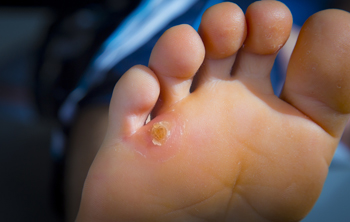Three Types of Corns
Tuesday, 24 August 2021 00:00 A small area of skin on the foot that has become thickened due to excess friction may be referred to as a corn. Wearing shoes that do not fit properly may cause corns to form, as well as other foot conditions like bunions or hammertoes. Research has shown there are three kinds of corns that can develop. A seed corn typically forms on the soles of the feet and often appear in groups. These types of corns can also be linked to dry skin. A soft corn is found between the toes and stays moist from wearing socks and shoes all day. Hard corns are generally the most common and are located on wider portions of thickened skin on the foot. Most corns become quite painful as they thicken and may appear infected. Relief may be found when appropriate shoes are worn, and a protective covering is placed over the corn as a layer of protection. Corns can disrupt one’s daily activities so it is strongly suggested that a consultation be scheduled with a podiatrist who can suggest effective treatment methods.
A small area of skin on the foot that has become thickened due to excess friction may be referred to as a corn. Wearing shoes that do not fit properly may cause corns to form, as well as other foot conditions like bunions or hammertoes. Research has shown there are three kinds of corns that can develop. A seed corn typically forms on the soles of the feet and often appear in groups. These types of corns can also be linked to dry skin. A soft corn is found between the toes and stays moist from wearing socks and shoes all day. Hard corns are generally the most common and are located on wider portions of thickened skin on the foot. Most corns become quite painful as they thicken and may appear infected. Relief may be found when appropriate shoes are worn, and a protective covering is placed over the corn as a layer of protection. Corns can disrupt one’s daily activities so it is strongly suggested that a consultation be scheduled with a podiatrist who can suggest effective treatment methods.
Corns can make walking very painful and should be treated immediately. If you have questions regarding your feet and ankles, contact Dr. Scott Shrem of Garden State Foot & Ankle Center. Our doctor will treat your foot and ankle needs.
Corns: What Are They? And How Do You Get Rid of Them?
Corns are thickened areas on the skin that can become painful. They are caused by excessive pressure and friction on the skin. Corns press into the deeper layers of the skin and are usually round in shape.
Ways to Prevent Corns
There are many ways to get rid of painful corns such as:
- Wearing properly fitting shoes that have been measured by a professional
- Wearing shoes that are not sharply pointed or have high heels
- Wearing only shoes that offer support
Treating Corns
Although most corns slowly disappear when the friction or pressure stops, this isn’t always the case. Consult with your podiatrist to determine the best treatment option for your case of corns.
If you have any questions please feel free to contact our office located in Hazlet, NJ . We offer the newest diagnostic and treatment technologies for all your foot and ankle needs.
Blog Archives
- July 2025
- June 2025
- May 2025
- April 2025
- March 2025
- February 2025
- January 2025
- December 2024
- November 2024
- October 2024
- September 2024
- August 2024
- July 2024
- June 2024
- May 2024
- April 2024
- March 2024
- February 2024
- January 2024
- December 2023
- November 2023
- October 2023
- September 2023
- August 2023
- July 2023
- June 2023
- May 2023
- April 2023
- March 2023
- February 2023
- January 2023
- December 2022
- November 2022
- October 2022
- September 2022
- August 2022
- July 2022
- June 2022
- May 2022
- April 2022
- March 2022
- February 2022
- January 2022
- December 2021
- November 2021
- October 2021
- September 2021
- August 2021
- July 2021
- June 2021
- May 2021
- April 2021
- March 2021
- February 2021
- January 2021
- December 2020
- November 2020
- October 2020
- September 2020
- August 2020
- July 2020
- June 2020
- May 2020
- April 2020
- March 2020
- February 2020
- January 2020
- December 2019
- November 2019
- October 2019
- September 2019
- August 2019
- July 2019
- June 2019
- May 2019
- April 2019
- March 2019
- February 2019
- January 2019
- December 2018
- November 2018
- October 2018
- September 2018
- August 2018
- July 2018
- June 2018
- May 2018
- April 2018
- March 2018








